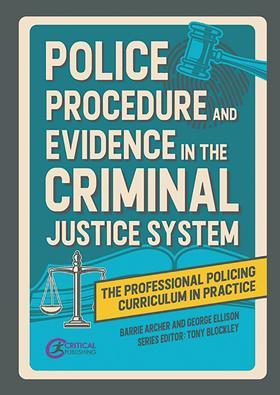On the beat with an innovative policing guide
Police Procedure and Evidence in the Criminal Justice System
Barrie Archer and George Ellison, edited by Tony Blockley
£18.99, Critical Publishing
★★★★✩
Unlike many books in the field of policing, Police Procedure and Evidence in the Criminal Justice System is incredibly interactive and arguably visionary in its method of incorporating an online presence at the end of each chapter.
As well as appealing to those with a keen interest in the field, this book will be of interest to undergraduates who want a career in policing but are not sure whether they wish to contend with traditional bulky manuals.

With a bold and contemporary design, the layouts ‘feel’ surprisingly tactile and engaging. Succinct paragraphs, consisting of six to 10 lines in a readable font, sit on a page of brilliant white, making them easy to read under a range of lighting conditions.
The language is balanced perfectly between the need for professional legal terminologies and the desire to keep the reader’s attention. Accessibility is reinforced throughout, with most pages featuring infographics and/or thinking bubbles. And each chapter concludes with a practice exercise, ensuring you have processed the substantive points of policing and criminal justice.
Chapter one jumps straight into policing powers. It divides these into three areas: the power to investigate crime, to prevent crime and to dispose of criminal cases (this is the power to apply discretion to how an offence is resolved). The narrative carries you effortlessly along, while considering myriad legislation and contemporary cases, along with the Police, Crime, Sentencing and Courts Act 2022. This methodology is repeated throughout the eight chapters.
The book concludes with a snapshot of criminological theories about why some people offend, citing academics from the 1940s to the present day. This invites the reader on to a path of continued discovery, making it an excellent book for universities and learning institutions more broadly.
Teena Lashmore is a lecturer at the University of East London, teaching the BSc in Professional Policing and Criminology































No comments yet